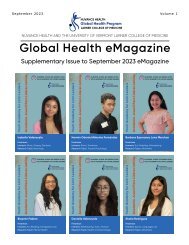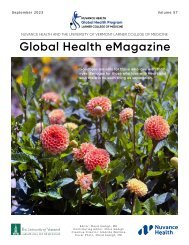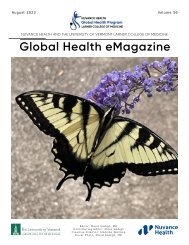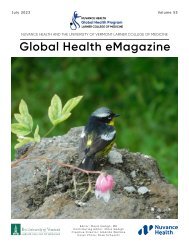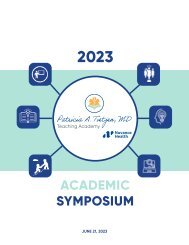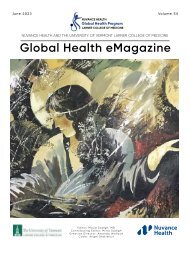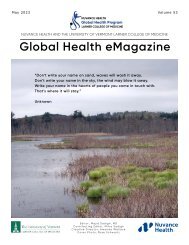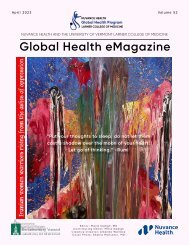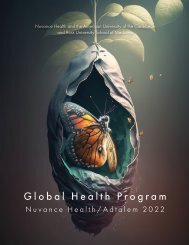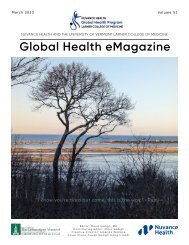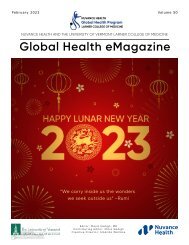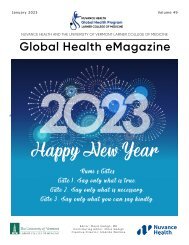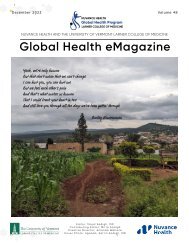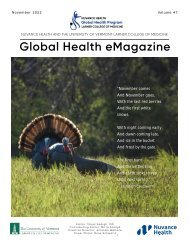You also want an ePaper? Increase the reach of your titles
YUMPU automatically turns print PDFs into web optimized ePapers that Google loves.
Joanna Pierce<br />
UVMLCOM Class <strong>of</strong> 2025<br />
Justin Henningsen, PhD<br />
UVMLCOM Class <strong>of</strong> 2025<br />
Lessons Learned from Ug<strong>and</strong>an Women<br />
Meeting so many impressive female doctors here in Ug<strong>and</strong>a has been<br />
very meaningful. This evening, for instance, I spoke with a female<br />
pediatric oncologist who joined us for dinner at the Luboga’s home. She<br />
shared similar encounters she had as a medical student <strong>and</strong> as a young<br />
doctor. It was encouraging to hear how she responded <strong>and</strong> ultimately<br />
excelled, securing her spot as one <strong>of</strong> only a few pediatric oncologists in<br />
all <strong>of</strong> Ug<strong>and</strong>a. Knowing that she <strong>and</strong> other female doctors have endured<br />
similar challenges gives me reassurance <strong>and</strong> encouragement to finish<br />
the last week in a more positive light. Encountering these biases <strong>and</strong><br />
speaking with women who have overcome them have helped me feel<br />
better prepared to navigate similar situations at home.<br />
Cultural Competency<br />
There was a period early in this century when “cultural competency” was<br />
an important buzzword. The zeitgeist seemed to focus on the idea that to<br />
underst<strong>and</strong> a person, you must truly underst<strong>and</strong> their culture. It seems<br />
so self-evident now how impossible, foolish even, such a task would be.<br />
We are all a product <strong>of</strong> our culture. It surrounds us, shaping our thoughts,<br />
emotions, <strong>and</strong> self-image. But what culture actually is—the stuff it is made<br />
<strong>of</strong>—is so abstract <strong>and</strong> amorphous that I think it is impossible to fully<br />
underst<strong>and</strong> one’s own culture, let alone another.<br />
This brings me back to the idea <strong>of</strong> cultural humility. It is the recognition that<br />
people are a product <strong>of</strong> their cultures, along with the knowledge that we<br />
cannot fully underst<strong>and</strong> the intricacies <strong>of</strong> another culture. Humility comes<br />
with a recognition that these differences exist <strong>and</strong> that one way is not better<br />
than another—just different.<br />
Bemen Habashi, MD<br />
Clinical Educator at the Yale-Waterbury Internal <strong>Medicine</strong> Residency Program<br />
Palliative Care<br />
I was invited to join the palliative outreach program for a visit. The services<br />
that they provide to care for these patients are amazing. They ensure to<br />
touch their patients on all levels: economically, socially, spiritually, <strong>and</strong><br />
medically to provide comfort. All free <strong>of</strong> charge. It is fascinating to know<br />
that in a country like Ug<strong>and</strong>a, with their limited medical resources, they<br />
do care for those patients who need some comfort due to the burden <strong>of</strong><br />
terminal illness. Ironically, in the United States, we do not have palliative<br />
care services except for a few academic facilities that strive to make it an<br />
affordable <strong>and</strong> available service for their patients.<br />
Joanna with the medical team<br />
50 ANNUAL REPORT <strong>2022</strong><br />
NUVANCE HEALTH AND THE UNIVERSITY OF VERMONT LARNER COLLEGE OF MEDICINE<br />
51




